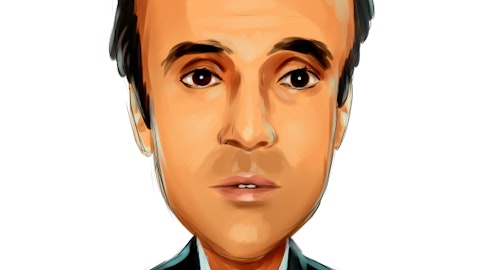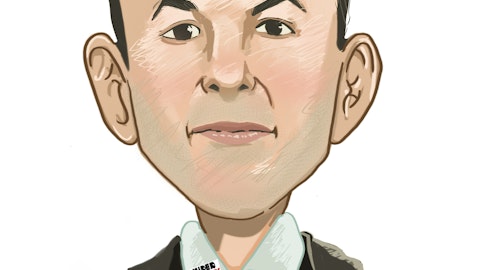You either have to put more spectrum on the existing grid. We don’t currently have a roadmap towards that. And so if wireless companies are going to support that need, they’re going to have to densify their grid. And a denser grid in the long run is good for a tower business, and it’s particularly good for our tower business. And the reason I say it’s particularly good for our tower business is that I think that our towers are particularly differentiated in terms of their proximity to other competitive towers. Doug mentioned in his prepared remarks, 30% of our tower portfolio doesn’t have another tower within two miles. And what that means is, as we move towards 6G and as the needs of the network get towards higher and higher bandwidth, those towers are going to be particularly differentiated.
And so you couple that with the fact that our existing colocation rate is already significantly below our competitors. I view that as only upside. Couple that with wireless companies are going to have to densify and our tower portfolio is really well positioned to support that densification. That’s why we remain really optimistic about the long-term growth in this segment. And I say segment, not formally a segment. The long-term growth in this portion of the business and notwithstanding some of the kind of more near-term slowdowns that we’re seeing, as folks pull back on capital. Hopefully, that gives you a sense about how we’re thinking about it.
Sergey Dluzhevskiy: Yes. Thank you. And my second question is both for LT and Michelle. So I think earlier this year, management of both companies talked about kind of stepping up collaboration efforts, including an MVNO relationship, reselling each other products, potentially applying for government funding together. So I was wondering — you’re close to the end of the year where you are in this collaboration process? And looking into 2024, I guess, to what degree does it make sense to apply for bid funding or other government funding together or roll out fiber services in some of UScellular markets if it makes sense to explore possibilities for a bundled offering. And any other thoughts you have on kind of broader collaboration too.
Laurent Therivel: So Sergey, I’ll let Michele talk about MVNO and how she and TDS are thinking about that. In terms of collaboration opportunities, you keyed on two of them. I think we continue to explore opportunities where we can co-sell. We have multiple pilots running where our footprint overlap. It’s a relatively small overlap as far as UScellular’s overall footprint, but where we do, we continue to see if there’s opportunities for us to market and sell and serve TDS’s wireline products, particularly fiber. You keyed on bid. I think that could be a really interesting opportunity. But we have to wait and see how the states are going to define the bid parameters. Let me just explain what I mean. It’s not clear to me if states are going to create a set geography and then put that, let’s call it, one-fourth of a state or a tenth of a state or a county.
And they’re going to say, please bid on this geography and what it would cost to connect all of the homes in that geography and underserved with whatever the best technology is that you have. If that’s the way states should choose to approach it, I think fiber companies of any sort, including TDS, are going to have to partner with wireless players because there’s almost certainly going to be homes in that geography, where it’s not cost effective and it’s not time effective to connect with fiber. Beautiful thing about this is, obviously, we already have an existing solid partnership and solid connections with TDS. So we think we’ll be particularly well positioned to bid for those areas where states choose that approach. But there’s a different approach they could take, right?
The second approach they could take is instead, they could define a geography and they could say, okay, fiber players, please bid for whichever connections, whichever homes you think you can connect in this area with fiber. And then they could come back with a second round and say, okay, whether it’s wireless players, fixed wireless swift, I don’t think satellite is particularly going to play very well, but they might try to. Can you now — what would it take for you to cover the rest of those homes? In that situation, there wouldn’t be as much opportunity to bid jointly. I personally think, based on my conversations with state officials, they’re going to be leaning more towards the former approach, which would lead for some really good collaboration opportunities.
But it’s a little bit early to tell. We’re still only seeing the first state plan start to trickle out, and we’re going to have to see more before we can really define the full potential of what that partnership might look like. I’ll let Michelle talk whatever she’d like to about the MVNO options at telecom.
Michelle Brukwicki : Yes. Thanks, LT. Yes, so for MVNO, we are currently making great progress on getting an MVNO product launched for TDS Telecom. It’s going to be called TDS Mobile. We’re in the final stages of contract negotiations and integrations with our partners. We are an NCTC member and so we have chosen to participate in the NCTC MVNO program and sign up with the partners that they have selected to support that program. However, we will also be working with UScellular. As we’ve mentioned in the past, UScellular does overlap with TDS Telecom’s footprint and about 40% of our geographies could be served by UScellular. And where that overlap happens, we do expect UScellular to be our partner to offer TDS Mobile. Where that does not overlap, then we will have to leverage a different wireless carrier, and that’s the partner that NCTC has chosen.
So we’re very excited about this new TDS mobile product. We’re getting very close, and we expect to have it launched here within in the next few months.
Sergey Dluzhevskiy: Got it. Thank you.
Operator: Thank you. And Ms. Thompson, I’ll turn things back to you for any closing comments at this time.
Colleen Thompson : Okay. Thanks, everyone, for your time today. Have a good weekend.
Operator: Thank you, Ms. Thompson. Ladies and gentlemen, it does conclude the TDS and UScellular third quarter 2023 operating results call. We’d like to thank you all so much for joining us and wish you all a great day. Goodbye.
Follow Array Digital Infrastructure Inc. (NYSE:AD)
Follow Array Digital Infrastructure Inc. (NYSE:AD)
Receive real-time insider trading and news alerts





